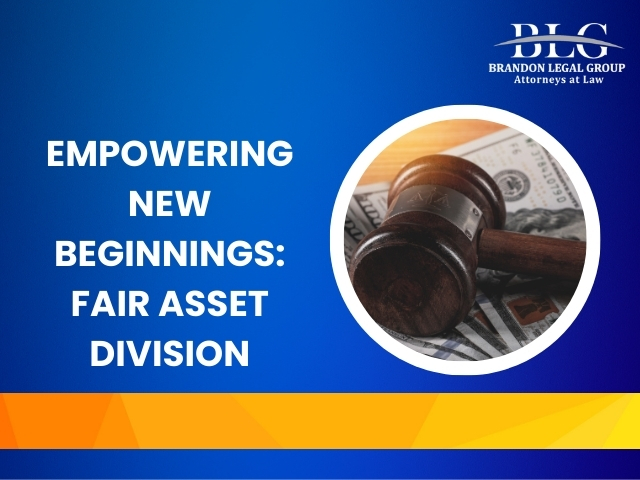Achieving a fair and just outcome in asset division during a divorce is essential for both parties to confidently embark on their new lives. This equitable resolution lays a solid foundation for future stability and opens the door to new opportunities.
Understanding Equitable Distribution
Equitable distribution is a legal principle used in many states to divide marital assets during a divorce. Unlike equal distribution, which simply splits assets 50/50, equitable distribution considers several factors to reach a fair division. This includes the length of the marriage, the contributions of each spouse, and the future financial needs of both parties.
The Legal Process of Asset Division
The process of dividing assets in a divorce involves several steps: identifying which assets are marital property, valuing these assets, and then distributing them equitably. This process can be complex, especially when dealing with high-value assets, businesses, or unique family situations.
Striving for Fair and Just Outcomes
A fair division of assets is essential for ensuring that both parties feel satisfied and respected post-divorce. It can prevent future conflicts and contribute to a more amicable separation.
The following is a DRAMATIZATION AND IS NOT AN ACTUAL EVENT: John and Lisa, after a 10-year marriage, decided to divorce. John was a successful entrepreneur, while Lisa had been a stay-at-home parent. Their attorney ensured that the asset division acknowledged Lisa’s non-financial contributions and John’s financial stability, leading to a fair settlement that respected the roles of both parties.
The Role of a Divorce Attorney in Asset Distribution
An experienced divorce attorney is invaluable in navigating the complexities of equitable distribution. They provide expertise in understanding the legal nuances, valuing assets accurately, and advocating for a fair division that reflects each party’s contribution to the marriage.
Preparing for the Asset Division Process
Preparation is key to ensuring a fair outcome in asset division. This includes gathering complete financial records, understanding your legal rights, and engaging with a knowledgeable divorce attorney who can guide you through the process.
Empowering Fresh Starts: Asset Division as a Stepping Stone
Asset division in divorce, while often perceived as a challenging process, can also be a significant step towards empowerment and new beginnings. This phase, when navigated thoughtfully, can set the stage for a positive and independent future post-divorce.
Asset Division as a Foundation for New Beginnings
The division of assets is more than just a legal necessity; it’s an opportunity to lay the groundwork for a fresh start. Equitable distribution can provide the financial resources needed to pursue new goals, such as further education, starting a business, or investing in personal growth.
Creating Financial Independence
A fair and just outcome in asset division can lead to newfound financial independence. This is particularly empowering for spouses who may have been financially dependent. Gaining control over one’s financial future is a crucial step towards self-reliance and confidence.
Strategies for Positive Outcomes
To leverage asset division as a stepping stone, it’s essential to approach the process with a clear strategy. This includes understanding the value of different assets, considering long-term financial goals, and seeking professional legal advice to ensure a fair distribution that aligns with future aspirations.
The following is a DRAMATIZATION AND IS NOT AN ACTUAL EVENT: In a fictional case, Laura successfully negotiated for assets that supported her dream of starting her own business. The equitable distribution not only provided her with the necessary capital but also symbolized her transition into a new, independent phase of life, full of potential and promise.
Embracing Opportunities for Renewal
Asset division in divorce can be a powerful catalyst for positive change. It offers a unique opportunity to reshape one’s life and embark on new journeys. With the right guidance and a focus on equitable outcomes, this process can be a significant step toward a fulfilling and empowered future.
FAQs
1. What factors are considered in equitable distribution?
Factors include the length of the marriage, each spouse’s income and assets, their future financial needs, and contributions to the marriage, both financial and non-financial.
2. How are complex assets like businesses handled?
Complex assets require careful valuation and legal expertise to ensure a fair division. This often involves financial experts and a deep understanding of both the asset’s value and its significance to each party.
3. Can a prenuptial agreement affect asset division?
Yes, a prenuptial agreement can significantly impact how assets are divided, as it may outline specific terms agreed upon before the marriage.
4. How can I ensure a fair division of assets?
Working with an experienced divorce attorney is the best way to ensure your interests are protected and the division of assets is fair and just.
Ensuring Equitable Outcomes in Divorce
In the challenging journey of divorce, achieving a fair and just outcome in asset division is paramount. With the right legal support, you can navigate this process confidently, ensuring that the outcome respects the contributions and needs of both parties.
If you are facing a divorce and seeking a fair division of assets, contact our law firm today. Our experienced attorneys are dedicated to ensuring that your rights are protected and your future is secured. Let us guide you towards a fair and just outcome in your divorce proceedings.
